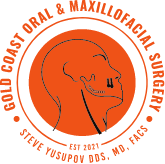Wisdom Tooth Extractions – Roslyn, NY
Eliminating Discomfort
by Removing Unnecessary Teeth
Wisdom teeth, also known as third molars, are often the last teeth to erupt. Teenagers and young adults between the ages of 17 and 25 typically begin to experience discomfort toward the back of the mouth. Whether caused by impaction or partial eruption, many believe it necessary to remove them. To minimize the pain and avoid potential orthodontic treatment, wisdom tooth extraction from our Roslyn, NY oral surgeon may be essential. Contact us to learn if your teen is a candidate.
Why Choose Gold Coast Oral & Maxillofacial Surgery Steve Yusupov DDS, MD, FACS for Wisdom Tooth Extractions?
-
1 Oral Surgeon with
Years of Experience -
2 Dental Technology Designed
for Added Comfort -
3 Friendly and Caring
Dental Team
Indications for Wisdom Tooth Removal
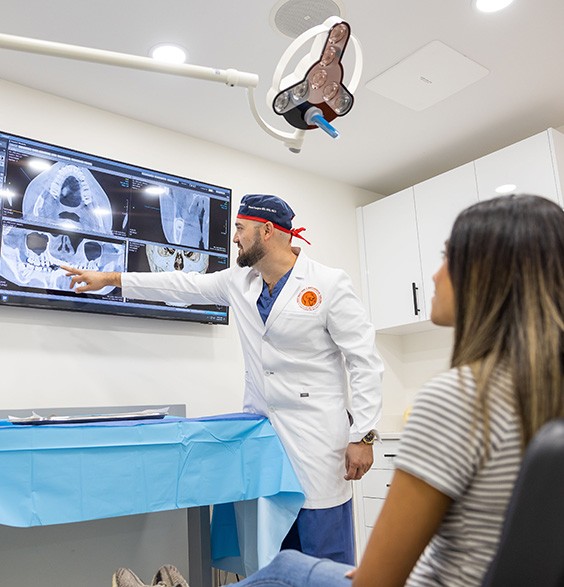
Not all patients require wisdom teeth removal; however, if you notice that your wisdom teeth are pressing against the gum line (impacted) or have only partially erupted and are causing much pain, it’s time to seek professional help. An infection can develop if left untreated. Our team will examine you or your child’s oral cavity to determine if these teeth should come out. If so, we will begin to plan your upcoming procedure.
Impacted Wisdom Teeth
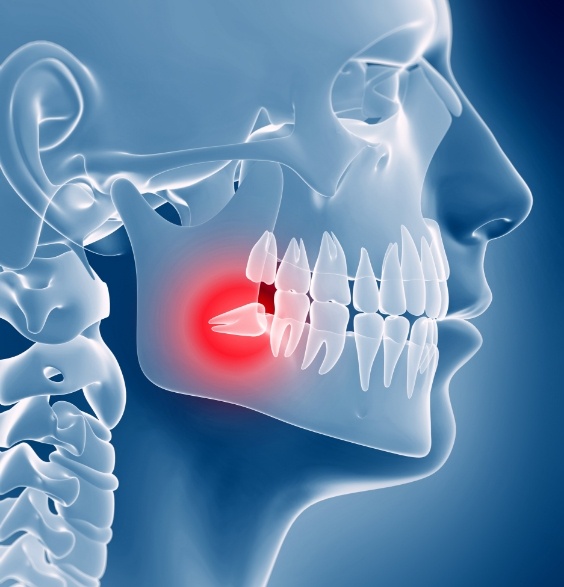
When a wisdom tooth is impacted, it cannot erupt because there is inadequate space within the oral cavity. Overcrowding can occur, which often leads to orthodontic treatment later on. It can also damage nearby teeth and gums and increase your risk for decay and disease. It is often necessary to remove impacted wisdom teeth even if they’re causing no pain, as you’ll want to avoid the potential for worsening oral health issues in the future.
The Wisdom Tooth Removal Procedure
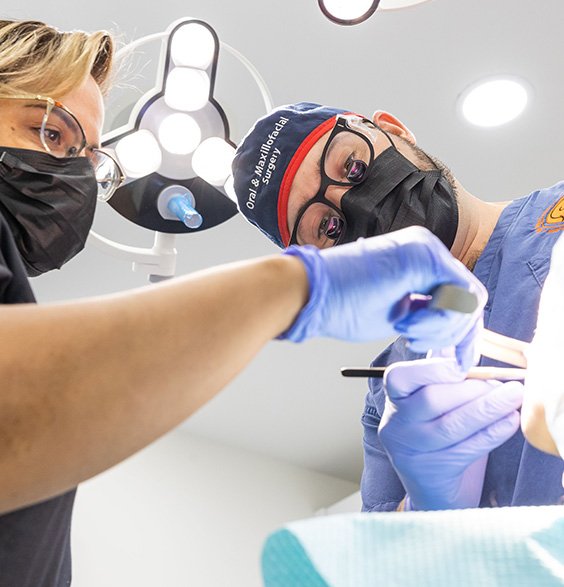
When your dentist deems it is time to have your wisdom teeth removed, you will be referred to our dental office. Dr. Yusupov and our team will take digital X-rays and closely examine your oral cavity to determine if you require a simple or surgical extraction. No matter how your teeth are removed, you’ll receive local anesthesia to numb your mouth before we dislodge your teeth from any bone tissue and close the surgical sites.
Aftercare for Wisdom Tooth Extraction
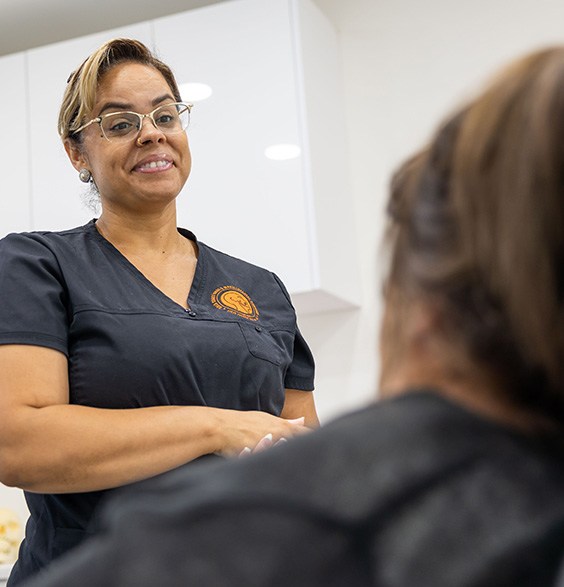
It is normal to experience some swelling, bleeding, and discomfort after wisdom teeth extraction, but we will ensure you receive prescribed medication to minimize your pain. You’ll need to remain at home the rest of the day and consume only soft foods for the first week. After that time, you can expect your mouth to be healed, allowing you to resume a normal diet and routine.
More About Wisdom Tooth Extraction
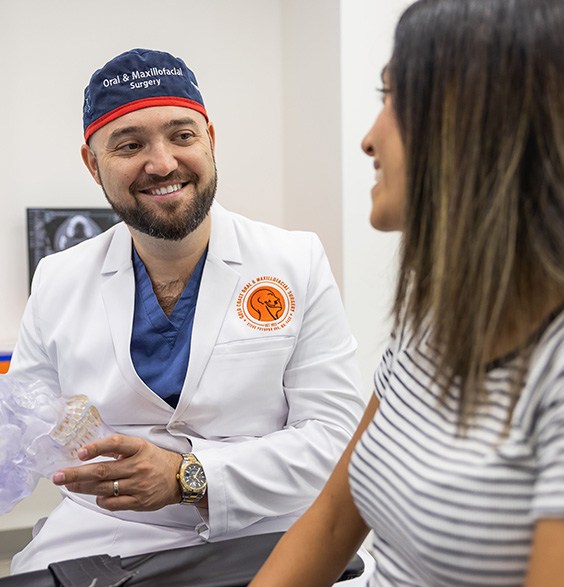
In general wisdom teeth are not functional teeth and do not contribute to chewing efficiency. Most wisdom teeth are impacted, meaning that a portion of the tooth or its entirety is covered by the gums and or bone. Impaction makes hygiene difficult and can result in an acute infection known as pericoronitis. This is usually manifested by acute pain, swelling, and difficulty opening the mouth. Chronic infections are possible too and are usually asymptomatic. These can result in periodontal inflammation, caries, and possibly disease of the second molars. Besides infection, impacted wisdom teeth can result in odontological pathology, which is most commonly benign cysts or growth that arise from the impacted wisdom teeth. Even though benign, these can sometimes result in destruction of associated teeth and bone.
Treatment of wisdom teeth falls into two main categories. First is when the impacted tooth is infected, carious, or has associated pathology. The most common treatment is the extraction of the tooth. Alternatively, based on the impacted wisdom tooth’s position and the patient's age prophylactic extractions may be recommended. In other words, younger patients have been shown to have fewer complications and an easier postoperative course compared to older patients after wisdom tooth extractions. Therefore if a tooth appears to have a high risk of infection or harboring pathology, extraction is recommended before those issues occur.
One of the most concerning complications that can arise from the extraction of wisdom teeth is an injury to sensory nerves in the area. The most common ones are nerves in the tongue and the lower lip. This risk mainly depends on the anatomic position and the relationship of the impacted wisdom tooth to the nerve. Frequently when there is a concern for nerve injury is high, additional 3D imaging may be warranted. In cases where the intimate relationship between the inferior alveolar nerve and the roots of the impacted tooth is confirmed on the cone beam CT scan, a coronectomy may need to be performed. This is a procedure where a portion (the crown) of the tooth is removed and the roots of the tooth are left in place to avoid manipulation and possible injury of the nerve.
Understanding the Cost of Wisdom Tooth Extractions

The third molars were likely a helpful tool for our ancestors, but these days, they tend to do more harm than good. If you need to have your wisdom teeth extracted, understanding how much this procedure costs is important. During your consultation with us, we will go over the expected cost in detail, so you won’t run into any surprises. Until then, here are some things to take into consideration.
Factors That Can Impact the Cost of Wisdom Tooth Extractions

The cost of wisdom tooth extractions can vary on a variety of factors. Here are the ones that have the greatest influence:
- Number of Teeth: Some people don’t develop all four of their wisdom teeth and others don’t need to have all four of their wisdom teeth extracted. When we examine your smile, we will determine the best solution for you.
- Impaction: If you have wisdom teeth that are impacted, the procedure is more complicated. This can lengthen treatment time, increasing the cost.
Does Dental Insurance Cover Wisdom Tooth Extractions?

Most dental insurance companies consider wisdom tooth extractions to be a major procedure, so it is usually covered at 50% after the deductible has been met and before the yearly maximum has been reached. Our team would be happy to help you understand your dental benefits and file claims on your behalf. At Gold Coast Oral & Maxillofacial Surgery, we are proud to be in-network with a long list of providers. We are also happy to work with out-of-network providers.
How to Make Wisdom Tooth Extractions Affordable

If you don’t have dental insurance, this doesn’t mean that you are completely out of luck. We are happy to accept payments through CareCredit, the Lending Club, and other third-party financing companies that can split the cost of your treatment into manageable monthly installments with little to no interest. To learn more about your financial options, don’t hesitate to reach out to one of our friendly team members.
Wisdom Tooth Extractions FAQs
Does Everyone Have Wisdom Teeth?
Surprisingly, no! In fact, one article published in the Dental Research Journal estimated that at least 5% of adults are missing one or more wisdom teeth. Since genetics is believed to be one of the biggest factors, your third set of molars may never come in if your parents or grandparents didn’t have any.
Of course, the best way to know how many molars you have, if they are growing in straight, or if there are any complications is to schedule a consultation with our Roslyn dental team so we can take the necessary X-rays. From there, we can conduct a comprehensive oral exam, share our findings, and let you know what the next best steps are!
How Should I Prepare for My Wisdom Tooth Extraction?
Prior to your appointment, we will let you know what you should do (and what you shouldn’t do). Some examples include not using tobacco products, stocking up on soft foods for the recovery period, and arranging for someone you know and trust to drive you to and from your appointment. If you’re being sedated, then we may also ask that you fast prior to your procedure to prevent feelings of nausea.
Is Wisdom Tooth Removal Painful?
Patients are often worried that the dental care they need will be painful, especially when it comes to root canals and tooth extractions. However, the first step of the treatment process is always the same: numbing your mouth. It’s also worth noting that sedation dentistry helps patients who experience head/neck/jaw pain during longer procedures (in addition to alleviating anxiety and helping those who struggle with a sensitive gag reflex). In other words, you don’t have to worry – we will do everything we can to make the entire treatment process as comfortable as possible.
Should Wisdom Teeth Be Removed If They Don’t Hurt?
If your wisdom teeth aren’t causing you any pain, having them removed may not seem urgent. That doesn’t mean that you should take the “wait and see” approach, however. After all, the third set of molars can lead to several complications, including an increased risk of chronic jaw pain, headaches, and infections. So, it’s best for your oral health, your overall health, and your quality of life in general to have them removed sooner rather than later.
How Soon Can I Eat After Wisdom Teeth Removal?
You need to wait until the numbing agent completely wears off, which usually takes a few hours. Even after you’ve regained full sensation in your mouth, you need to avoid sugary, spicy, acidic, and crunchy foods. Instead, stick to extremely soft ones, like plain yogurt. Make sure that you check the temperature first as well (anything hot or cold could lead to considerable sensitivity).
How Do You Avoid Dry Socket After Wisdom Teeth Removal?
A dry socket is when the blood clot that forms over the socket is pulled out of place. Not only is it seriously painful, but it also delays the healing process. To help reduce your risk, we will provide you with a list of aftercare instructions, including not using a straw, not using tobacco products, and not spitting. If you think you may have a dry socket, then call us ASAP.
